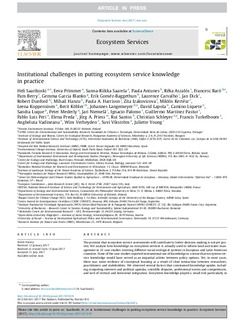| dc.contributor.author | Saarikoski, Heli | |
| dc.contributor.author | Primmer, Eeva | |
| dc.contributor.author | Saarela, Sanna-Riikka | |
| dc.contributor.author | Antunes, Paula | |
| dc.contributor.author | Aszalós, Réka | |
| dc.contributor.author | Baró, Francesc | |
| dc.contributor.author | Berry, Pam | |
| dc.contributor.author | Blanko, Gemma Garcia | |
| dc.contributor.author | Gomez-Baggethun, Erik | |
| dc.contributor.author | Carvalho, Laurence | |
| dc.contributor.author | Dick, Jan | |
| dc.contributor.author | Dunford, Robert | |
| dc.contributor.author | Hanzu, Mihail | |
| dc.contributor.author | Harrison, Paula A. | |
| dc.contributor.author | Izakovicova, Zita | |
| dc.contributor.author | Kertész, Miklós | |
| dc.contributor.author | Kopperoinen, Leena | |
| dc.contributor.author | Köhler, Berit | |
| dc.contributor.author | Langemeyer, Johannes | |
| dc.contributor.author | Lapola, David Montenegro | |
| dc.contributor.author | Liquete, Camino | |
| dc.contributor.author | Luque, Sandra | |
| dc.contributor.author | Mederly, Peter | |
| dc.contributor.author | Niemela, Jari | |
| dc.contributor.author | Palomo, Ignacio | |
| dc.contributor.author | Pastur, Guillermo Martinéz | |
| dc.contributor.author | Peri, Pablo Luis | |
| dc.contributor.author | Preda, Elena | |
| dc.contributor.author | Priess, Jörg A. | |
| dc.contributor.author | Santos, Rui | |
| dc.contributor.author | Schleyer, Christian | |
| dc.contributor.author | Turkelboom, Francis | |
| dc.contributor.author | Vadineanu, Angheluta | |
| dc.contributor.author | Verheyden, Wim | |
| dc.contributor.author | Vikström, Suvi | |
| dc.contributor.author | Young, Juliette | |
| dc.date.accessioned | 2018-02-08T11:33:39Z | |
| dc.date.available | 2018-02-08T11:33:39Z | |
| dc.date.created | 2018-01-23T17:47:55Z | |
| dc.date.issued | 2017 | |
| dc.identifier.issn | 2212-0416 | |
| dc.identifier.uri | http://hdl.handle.net/11250/2483488 | |
| dc.description.abstract | The promise that ecosystem service assessments will contribute to better decision-making is not yet proven. We analyse how knowledge on ecosystem services is actually used to inform land and water management in 22 case studies covering different social-ecological systems in European and Latin American countries. None of the case studies reported instrumental use of knowledge in a sense that ecosystem service knowledge would have served as an impartial arbiter between policy options. Yet, in most cases, there was some evidence of conceptual learning as a result of close interaction between researchers, practitioners and stakeholders. We observed several factors that constrained knowledge uptake, including competing interests and political agendas, scientific disputes, professional norms and competencies, and lack of vertical and horizontal integration. Ecosystem knowledge played a small role particularly in those planning and policy-making situations where it challenged established interests and the current distribution of benefits from ecosystems. The factors that facilitated knowledge use included application of transparent participatory methods, social capital, policy champions and clear synergies between ecosystem services and human well-being. The results are aligned with previous studies which have emphasized the importance of building local capacity, ownership and trust for the long-term success of ecosystem service research. | nb_NO |
| dc.language.iso | eng | nb_NO |
| dc.rights | Attribution-NonCommercial-NoDerivatives 4.0 Internasjonal | * |
| dc.rights.uri | http://creativecommons.org/licenses/by-nc-nd/4.0/deed.no | * |
| dc.title | Institutional challenges in putting ecosystem service knowledge in practice | nb_NO |
| dc.type | Journal article | nb_NO |
| dc.type | Peer reviewed | nb_NO |
| dc.description.version | publishedVersion | nb_NO |
| dc.subject.nsi | VDP::Økonomi: 210 | nb_NO |
| dc.subject.nsi | VDP::Economics: 210 | nb_NO |
| dc.source.journal | Ecosystem Services | nb_NO |
| dc.identifier.doi | 10.1016/j.ecoser.2017.07.019 | |
| dc.identifier.cristin | 1550307 | |
| dc.relation.project | EU/OpenNESS (code 308428) | nb_NO |
| cristin.unitcode | 7511,5,0,0 | |
| cristin.unitname | Lillehammer | |
| cristin.ispublished | true | |
| cristin.fulltext | original | |
| cristin.qualitycode | 1 | |

